牛津大学法学院Mindy Chen-Wishart研究员访问人大法学院
人大法学院徐副教授与美国东北大学法学院Austin副教授商谈学术交流与合作事宜
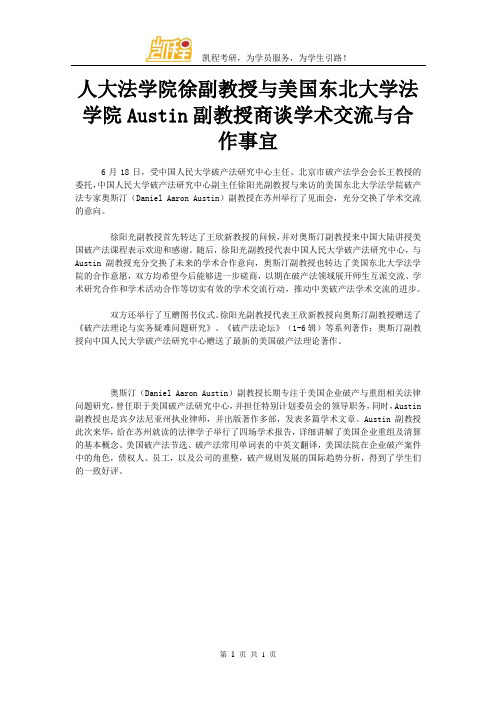
凯程考研,为学员服务,为学生引路!第 1 页 共 1 页 人大法学院徐副教授与美国东北大学法学院Austin 副教授商谈学术交流与合作事宜6月18日,受中国人民大学破产法研究中心主任、北京市破产法学会会长王教授的委托,中国人民大学破产法研究中心副主任徐阳光副教授与来访的美国东北大学法学院破产法专家奥斯汀(Daniel Aaron Austin )副教授在苏州举行了见面会,充分交换了学术交流的意向。
徐阳光副教授首先转达了王欣新教授的问候,并对奥斯汀副教授来中国大陆讲授美国破产法课程表示欢迎和感谢。
随后,徐阳光副教授代表中国人民大学破产法研究中心,与Austin 副教授充分交换了未来的学术合作意向,奥斯汀副教授也转达了美国东北大学法学院的合作意愿,双方均希望今后能够进一步磋商,以期在破产法领域展开师生互派交流、学术研究合作和学术活动合作等切实有效的学术交流行动,推动中美破产法学术交流的进步。
双方还举行了互赠图书仪式。
徐阳光副教授代表王欣新教授向奥斯汀副教授赠送了《破产法理论与实务疑难问题研究》、《破产法论坛》(1-6辑)等系列著作;奥斯汀副教授向中国人民大学破产法研究中心赠送了最新的美国破产法理论著作。
奥斯汀(Daniel Aaron Austin )副教授长期专注于美国企业破产与重组相关法律问题研究,曾任职于美国破产法研究中心,并担任特别计划委员会的领导职务,同时,Austin 副教授也是宾夕法尼亚州执业律师,并出版著作多部,发表多篇学术文章。
Austin 副教授此次来华,给在苏州就读的法律学子举行了四场学术报告,详细讲解了美国企业重组及清算的基本概念、美国破产法节选、破产法常用单词表的中英文翻译,美国法院在企业破产案件中的角色,债权人、员工,以及公司的重整,破产规则发展的国际趋势分析,得到了学生们的一致好评。
The_Dissemination_of_Intangible_Cultural_Heritage_

Cultural and Religious Studies, May 2023, Vol. 11, No. 5, 241-245doi: 10.17265/2328-2177/2023.05.005 The Dissemination of Intangible Cultural Heritage AlongBeijing-Hangzhou Canal Based on Encoding/Decoding Theory *TAN Hao, XIANYU JingBeijing Union University, Beijing, ChinaThe Beijing-Hangzhou Grand Canal carries a wealth of Chinese cultural symbols, showing the lifestyle and wisdomof working people through ages. The preservation and inheritance of its intangible cultural heritage can help to evokecultural memories and cultural identification of the Canal and build cultural confidence. This paper applies StuartHall’s encoding/decoding theory to analyze the dissemination of intangible heritage tourism culture. On the basis ofa practical study of the villages along the Beijing-Hangzhou Grand Canal, this paper analyses the problems in thetransmission of its intangible cultural heritage and proposes specific methods to solve them in four processes,encoding, decoding, communication, and secondary encoding, in order to propose references for the transmission ofintangible heritage culture at home and abroad.Keywords: dissemination, encoding, decoding, intangible cultural heritageIntroductionThe Beijing-Hangzhou Grand Canal was built during the Spring and Autumn Period, and it has a history of more than 2,500 years. With a total length of about 1,797 kilometers, it is a historical treasure that is closely related to the lifestyle of working people and traditional Chinese culture, including traditional music, traditional dance, traditional painting, traditional skills, etc. For many reasons, the Canal’s intangible cultural heritage (ICH) has not yet been effectively inherited and disseminated, and it is also in danger of being lost. Stuart Ha ll’s encoding/decoding theory model is able to break away from the shackles of subject-object linear transmission of culture communication, and view the process of ICH transmission from the perspective of encoding-communication-decoding. The study of the ICH tourism culture circulation through encoding and decoding theory has both practical and historical significance.Method for StudyStuart Hall argues that discourse is like a commodity that goes through the four stages of production, circulation, consumption, and reproduction described by Marxism (Chen & Lin, 2014), and suggests that individuals may resist or negotiate on the dissemination of an ideology (Evan, 2015). China is rich in ICH, but if it is not disseminated, the preservation of heritage would become completely impotent. As Foucault put it, “criticism” is one of the circulation mechanisms for knowledge to release its power (Claudia & Donna, 2021). * This paper is supported by the National Social Science Fund Project (No. 20BH151).TAN Hao, post-graduate student, College of Applied Science and Technology of Beijing Union University, Beijing, China. XIANYU Jing (corresponding author), Ph.D., Associate Professor, Tourism College of Beijing Union University, Beijing, China.DA VID PUBLISHINGDTHE DISSEMINATION OF INTANGIBLE CULTURAL HERITAGE242Wu (2007) points out that cultural communication is both a social phenomenon and a fundamental part of tourism destination marketing, and the transmission of information is also an important form of tourism service.The transmission of ICH tourism culture goes through three stages: encoding, communication, and decoding. The encoding process refers to the production of ICH tourism products, which emphasizes modern artistic processing while preserving the authenticity of ICH and presenting in a way that is pleasing to the audience. The Grand Canal ICH is not only an indispensable part of canal cultural heritage, but also a potential tourism resource for tourist destination development (Zhang, 2020). The communication process of ICH is to disseminate the encoded ICH information to the audience via various forms. In this process, the discourse of ICH is not a closed system, but consists of topics, treatments, issues, and events (Zou, 2014). The decoding process of ICH means that after the audience receives the ICH discourse, they decode the ICH elements in it according to their own cognition. In view of the decoders’different attitudes when they are decoding the symbolic meanings, Hall applies three scenarios to describe the three positions of the audience in the decoding process, namely, the dominant position, the negotiated position, and the confrontational position. The decoding process of ICH requires mutual feedback between encoding and decoding processes, in order to achieve good communication effects, and the secondary encoding is needed when necessary.FindingsLack of EncoderAt present, most of villages of the Grand Canal have not paid much attention to the cultivation of the ICH inheritors, and some masters of art have passed away, the problem of their aging being serious, and some kinds of ICH are facing the dilemma of no one to encode it, such as Work Song of Boatmen, Woodcut New Year Pictures. Fewer ICH tourism products are encoded for international tourists, resulting in the weakness of international dissemination. In encoding stage, important issues that need to be solved are how to keep the authenticity of traditional ICH while keeping up with the times, and how to extract potential ICH in each section of the Beijing-Hangzhou Grand Canal that can show the geographical characteristics and highlight the uniqueness of the Grand Canal ICH.Being Poor in Communication EffectThe current dissemination of the Canal ICH is facing the problems of monotonous communication channel and weak interaction with the audience. According to the investigation, three reasons lead to these problems: Firstly, there is a lack of derivative products from the reprocessing and re-creation of ICH elements in tourism products or tourist attractions, resulting in tourists’ unclear concept of intangible cultural heritage (Haleh, Mohammad, & Neda, 2019) and lack of proper ways to deeply understand ICH elements. Secondly, most of the ICH products are not targeted for different groups or through various channels when they are sold or exhibited, resulting in the weakness of dissemination. Third, there are few channels for communication and interaction between the encoders and decoders, and the weak interaction between decoders and encoders may lead to the insufficient understanding of ICH elements by decoders. The communication channel of ICH for the international public still remains in the traditional way of TV media, so it is difficult for the international public to receive the symbols containing Chinese ICH.Decoders’ Hardness to Stand in Dominant PositionFrom the perspective of decoding effect, the decoding of ICH in tourism products or tourism performancesTHE DISSEMINATION OF INTANGIBLE CULTURAL HERITAGE243in China generally suffers from the problem that the audience decoding the ICH is difficult to be in a dominant position (Guo & Wang, 2019). The main reason is that most kinds of ICH have its unique regional characteristics, but the audience lacks a certain understanding of ICH with local characteristics due to the limitations of geographic space and decoders’ background knowledge. This will lead to deviations in their understanding of the connotations and values expressed by ICH elements in tourism products or performances. Secondly, the encoder will artistically create the ICH elements in tourism products or performances, while the decoder has a subjective understanding of the ICH elements in tourism products or performances due to their prior knowledge level and acceptability, which would lead to unsatisfactory communication effect. Thirdly, the audience’s understanding of ICH is not fed back to the encoder through effective channels, or the encoder does not pay enough attention to the feedback and lacks targeted secondary encoding, which makes it difficult for the audience to be in a dominant position in the decoding process.SolutionsEncoding: Inherit and Innovate Encoding Models, Educating EncoderIn this process, we should enhance the innovation of the encoding mode for ICH tourism products.The first is to innovate the expression of the theme symbol of tourism products. Although ICH itself is intangible, it can be transmitted by means of physical ICH cultural products, which requires the encoder to have an objective and accurate understanding of the ICH involved in the product and avoid the subjective elements being blindly planted into it by the encoder.Second, we should use symbols carrying meaning to transmit these codes innovatively. In the encoding process of ICH tourism products, the encoder should first clarify the thematic direction of the products, combine various carriers for transmitting symbols such as visual transmission or audio transmission, incorporate emerging technologies and equipment into the encoding process, and encode ICH suitable for different types of people, so as to achieve the best effect when transmitting symbols. Focusing on the excavation of potential ICH, the production process of ICH products can help to awaken the non-physical cultural memory of tourists and evoke their cultural memory and cultural identity. In this process, it is more important to excavate the discourse of potential ICH than simply disseminate the textual symbols.In addition, there is a need to focus on the cultivation and education of intangible heritage inheritors. Most living ICH masters are old, and if their skills are not inherited, it will cause irreparable loss of intangible cultural heritage (Qi, 2006). The cooperation with local secondary schools or universities to set up special courses on intangible heritage culture will promote the inheritance of ICH.In addition to hiring traditional talents of ICH, attention should be paid to finding modern talents who master emerging technologies and understand the frontiers of culture so as to achieve the integration of traditional culture and modern technology at the encoding process. It can systematically cultivate multi-talented ICH encoders who are dialectically unified between tradition and modernity, thus highlighting the core of ICH at the encoding stage. Communication: Broaden Communication Channels & Refine Communication Content The ways for ICH dissemination are still traditional and backward at present, and we should try to present and spread brilliant ICH of the Canal. Performing a series of arts activities and festivals in tourist destinations and uploading them to the Internet platform can surely evoke people’s cultural memories and make them identify with the ICH. In this process, attention should be paid to breaking the barrier between different regions, andTHE DISSEMINATION OF INTANGIBLE CULTURAL HERITAGE244harmonizing the relationship between regional characteristics of ICH and internationalization of its content to disseminate ICH abroad. We can also make documentary or online videos, spread coded cultural symbols on media platforms for foreigners, and concentrate on the follow-up work after the dissemination. To avoid aberrant decoding, it is important to consider what is missed or may misguide people in the description of ICH during dissemination, as mass travelers mainly rely on advertisements or brochures to learn about their tourist destinations, and they do not realize that they may subvert the stereotypes. Therefore, the description of ICH is equally crucial in this context (Ira, 1993).Decoding: Increase the Depth of Traveler Participation & Prevent Decoding Mismatches In order to achieve a better circulation effect, the audience’s decoding of the ICH should be oriented to the dominant position. In the dominant position, the decoder can accurately understand the meaning expressed by the Grand Canal ICH performance encoder and can maintain the same understanding of ICH with the encoder. The authenticity of the ICH performance connects encoder and tourists in their spirit, thus seeking deep integration and promoting the cultural identification of the tourists (Miguel, 2008). Experiential ICH tourism allows decoders to participate in ICH tourism actively, shifting decoders in negotiated position or confrontational position to the dominant position. At present, the participatory and experiential aspects of canal ICH tourism products are generally not well enough, tourists basically appreciating them passively. Therefore, we should promote the development of experiential ICH tourism products to integrate touring, entertainment, experience, and learning through engagement, connection, and creation, so as to enhance the participation, interaction, knowledge, and fun of the Grand Canal ICH tourism process and enter into a shared ritualized field (Han, 2014). Secondary Encoding: Collect Feedback & Enhance Consumer StickinessSecondary encoding seems to be a feedback process that may be neglected by the encoders at the end of the circulation, but it is actually significant. In the ICH tourism circulation, some traditional customs of the Canal like Fisherman’s Wedding Ceremony or Sacrifice to the River God are quite ritualistic but it may bring a sense of distance and strangeness to the decoder at the same time. ICH tourism should not only focus on the mode of transmission, but also on the interaction and the feedback of audience (Zhou & Zhang, 2022). Encoders need to focus on post-communication feedback when facing mismatch that occurs between the encoder and the decoder, so as to improve the quality of secondary encoding. In the late stage of circulation, establishing a reasonable feedback mechanism is an urgent issue to be solved, and only when the feedback is really received by the encoder can the secondary encoding be improved. Before the ICH performance, the encoder can design a questionnaire according to its theme, and when the audience enters, the staff distributes the questionnaire to them and collects the feedback from the audience, and then carefully sorts out the feedback. Then the encoders reflect on the results and transform the feedback into the ideas of secondary encoding. Through some new and popular ways such as social media, surveys, or prize quizzes, to keep abreast of the audience’s thoughts and preferences for ICH products. In this way, it is possible to verify the dissemination of encoder’s pre-determined meaning of the ICH symbols after the communication process. So that the understanding of the decoder will be consistent with the encoder’s original intention, and the decoder is always in the dominant position, and thus the dissemination effect can be maximized. The secondary encoding experience of other cultural products also can be used for reference in the development of derivatives and enhancement of consumers’ stickiness. On the basis of catering to decoders’preferences, combining with aspects of decoders’ daily life and online platforms, we can disseminate the encoded ICH symbols into all aspects of decoder’s life.THE DISSEMINATION OF INTANGIBLE CULTURAL HERITAGE245ConclusionThe Grand Canal culture has a long history, and various kinds of ICH with regional characteristics record the way of Chinese lifestyle for thousands of years. By analyzing the dissemination of ICH along the Beijing-Hangzhou Grand Canal with Stuart Hall’s encoding/decoding theory, we can find that the transmission of its ICH is suffering from the lack of encoder, poor communication effect, and the decoders’ hardness to stand in the dominant position. In the encoding stage, ICH circulation should focus on the inheritance, the cultivation of ICH encoders, and the encoding of tourism cultural products. In the communication stage, it should broaden the dissemination channels and refine the contents. In the decoding stage, it should increase the participation of decoders to prevent decoding mismatch and collect feedback from decoders to improve the secondary encoding quality. We should improve the universality and accuracy of ICH in terms of encoding, communication, decoding, and secondary encoding with the help of its immaterial attributes, use modern technology and diversified ways to inherit ICH with its historical connotation, so that decoders are in the dominant position to make ICH of the Canal better inherited and developed.ReferencesChen, L. D., & Lin, Y. F. (2014). Inheritance and innovation: A study of Stuart Hall’s masterpiece Encoding/Decoding. Journalism & Communication, 21(8), 99-112.Claudia, M., & Donna, D. (2021). The construction of intangible cultural heritage: A Foucauldian critique. Annals of Tourism Research, 89(1), 1-11.Evan, L. K. (2015). Using social scientific criteria to evaluate cultural theories: Encoding/decoding theory. KOME, 22(1), 10-26. Guo, X. R., & Wang, N. (2019). Research on the strategy for video transmission of intangible cultural heritage in China from the perspective of coding and decoding theory—Case study of the story of Yanxi Palace. Cultural Industry Research, 2(1), 123-134.Haleh, M., Mohammad, M., & Neda, T. F. (2019). A study on t ourists’ tendency toward intangible cultural heritage as an attraction (Case study: Isfahan, Iran). City, Culture and Society, 17(1), 54-60.Han, B. Y. (2014). The development model of Rizhao intangible cultural heritage from the perspective of tourism. China Journal of Commerce, 20(1), 184-185.Ira, S. (1993). Marketing authenticity in third world countries. Annals of Tourism Research, 20(1), 302-318.Miguel, V. G. (2008). Intangible heritage tourism and identity. Tourism Management, 39(1), 807-810.Qi, Q. F. (2006). Study on the transmission and inheritors in the protection of intangible cultural heritage. Journal of Northwestern Ethnic Studies, 3(1), 114-123.Wu, N. (2007). Information dissemination: A key link in the marketing and service of tourist destinations. Tourism Tribune, 10(1), 67-70.Zhang, B. F. (2020). Study on the interactive model of intangible cultural heritage protection and tourism development in Beijing-Hangzhou Canal. Gansu Theory Research, 1(1), 103-109.Zhou, K., & Zhang, Y. (2022). The function and path of culture communication of intangible cultural heritage tourism: A perspective from the ritual view. Journal of Shandong University (Philosophy and Social Sciences), 4(1), 40-46.Zou, W. H. (2014). A study of Stuart Hall’s theory of culture. Beijing: China Social Sciences Press.。
人大法学院法学暑期研习班成功举行

人大法学院法学暑期研习班成功举行8月20日至31日,中国人民大学牛津法学暑期研习班在北京成功举行。
在去年英国宪法暑期研习班的基础上,今年中国人民大学牛津法学暑期研习班新增了私法课程,并将在公法班采纳了新的教学方式。
研习班共设英国公法研习班和英国合同法研习班两门课程。
英国公法研习班由中国人民大学法学院、中国人民大学宪政与行政法治研究中心共同举办;英国合同法研习班中国人民大学法学院、中国人民大学民商事法律科学研究中心共同举办。
8月27日,中国人民大学法学院院长韩教授会见并宴请了本次暑期班三位授课教师Jeremias Prassl,Nick Barber和Jeff King,对他们专程前来授课表示感谢,并就深化合作事宜进行了探讨。
副院长王轶教授、时副教授陪同参加会见和宴请。
英国合同法暑期研习班本次英国合同法暑期研习班由英国牛津大学法学院Jeremias Prassl博士授课。
Jeremias Prassl是哈佛大学法学硕士,牛津大学法学博士,目前除在牛津大学法学院任教外,还担任瑞银投资银行学术顾问、德国汉堡马普研究所国际与比较私法研究中心访问研究员。
本次授课的主要内容集中在合同的缔结与违约行为的弥补两个主题上,同时还探讨了侵权法上的一些关键问题(尤其是由过失引起的侵权责任)。
暑期班报名公告发布后,收到了来自全国多所高校的60余位博士、硕士研究生和部分青年教师的申请材料。
经选拔,最终录取了来自北京大学、浙江大学、南京大学、武汉大学、山东大学、吉林大学、中国政法大学、西南政法大学、对外经济贸易大学、北京航空航天大学、中国计量学院以及中国人民大学的20位博士、硕士研究生参加暑期班。
8月20日,英国合同法暑期研习班正式开课。
课前举行了开课仪式,中国人民大学法学院副院长、中国人民大学民商事法律科学研究中心副主任王轶教授致欢迎词,他对Jeremias Prassl博士的到来表示感谢,并对各位学员提出殷切期待和热切鼓励。
人大法学院与意大利罗马智慧大学法学院签订合作联合声明

凯程考研,为学员服务,为学生引路!
第 1 页 共 1 页 人大发学院与意大利罗马智慧大学法学
院签订合作联合声明
11月6日,中国人民大学法学院与意大利罗马智慧大学(即罗马一大)法学院在意方校长会议厅举行了联合声明的签字仪式。
我院副院长王教授代表我院出席签字仪式,民商事法律科学研究中心主任杨教授、民商法教研室主任姚教授及李助理教授出席签字仪式。
罗马智慧大学校长Frati 教授,副校长Biagini 教授,法学院院长Spangher 教授,法律科学系主任Passerelli 教授,资深罗马法学者Schipani 教授等作为意方代表出席了签字仪式。
Frati 校长首先对我院访问团的到访表示欢迎,并表达了他本人对于能和中国一流的法学院签订合作声明、建立合作关系的喜悦和祝贺。
同时他希望,在不久的将来,这种合作能够扩展到两个高校之间,在所有学科领域内实现广大师生、教学和科研间的全方位合作。
王副院长首先表达了对罗马智慧大学和资深罗马法教授斯奇巴尼教授所发出合作邀请的感谢。
他表示深入开展罗马法研究对于建设学科全面发展的人大法学院具有重要意义,有益于加强学生对大陆法系法学原理的深入理解和研究,与罗马智慧大学之间开启的这一合作通道必然能促进人大法学院在此目标上的发展。
同时他还向意方介绍了人大法学院与外国院校之间的多种合作模式,并希望能进一步加强与罗马智慧大学之间的学术联系,开展多种渠道的合作交流。
继哈佛大学后,又一位女性出任世界顶级名校牛津大学校长!
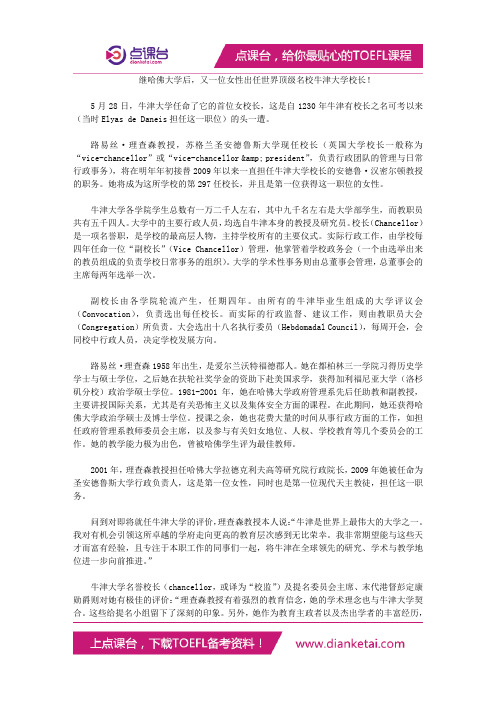
继哈佛大学后,又一位女性出任世界顶级名校牛津大学校长!5月28日,牛津大学任命了它的首位女校长,这是自1230年牛津有校长之名可考以来(当时Elyas de Daneis担任这一职位)的头一遭。
路易丝·理查森教授,苏格兰圣安德鲁斯大学现任校长(英国大学校长一般称为“vice-chancellor”或“vice-chancellor & president”,负责行政团队的管理与日常行政事务),将在明年年初接替2009年以来一直担任牛津大学校长的安德鲁·汉密尔顿教授的职务。
她将成为这所学校的第297任校长,并且是第一位获得这一职位的女性。
牛津大学各学院学生总数有一万二千人左右,其中九千名左右是大学部学生,而教职员共有五千四人。
大学中的主要行政人员,均选自牛津本身的教授及研究员。
校长(Chancellor)是一项名誉职,是学校的最高层人物,主持学校所有的主要仪式。
实际行政工作,由学校每四年任命一位“副校长”(Vice Chancellor)管理,他掌管着学校政务会(一个由选举出来的教员组成的负责学校日常事务的组织)。
大学的学术性事务则由总董事会管理,总董事会的主席每两年选举一次。
副校长由各学院轮流产生,任期四年。
由所有的牛津毕业生组成的大学评议会(Convocation),负责选出每任校长。
而实际的行政监督、建议工作,则由教职员大会(Congregation)所负责。
大会选出十八名执行委员(Hebdomadal Council),每周开会,会同校中行政人员,决定学校发展方向。
路易丝·理查森1958年出生,是爱尔兰沃特福德郡人。
她在都柏林三一学院习得历史学学士与硕士学位,之后她在扶轮社奖学金的资助下赴美国求学,获得加利福尼亚大学(洛杉矶分校)政治学硕士学位。
1981-2001年,她在哈佛大学政府管理系先后任助教和副教授,主要讲授国际关系,尤其是有关恐怖主义以及集体安全方面的课程。
牛津大学法学院院长Timothy Endicott访问人大法学院并主讲名家法学讲坛
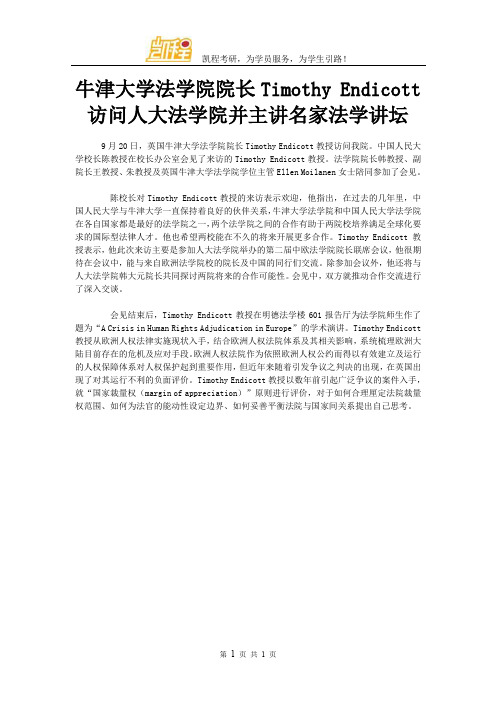
凯程考研,为学员服务,为学生引路!第 1 页 共 1 页 牛津大学法学院院长Timothy Endicott 访问人大法学院并主讲名家法学讲坛 9月20日,英国牛津大学法学院院长Timothy Endicott 教授访问我院。
中国人民大学校长陈教授在校长办公室会见了来访的Timothy Endicott 教授。
法学院院长韩教授、副院长王教授、朱教授及英国牛津大学法学院学位主管Ellen Moilanen 女士陪同参加了会见。
陈校长对Timothy Endicott 教授的来访表示欢迎,他指出,在过去的几年里,中国人民大学与牛津大学一直保持着良好的伙伴关系,牛津大学法学院和中国人民大学法学院在各自国家都是最好的法学院之一,两个法学院之间的合作有助于两院校培养满足全球化要求的国际型法律人才。
他也希望两校能在不久的将来开展更多合作。
Timothy Endicott 教授表示,他此次来访主要是参加人大法学院举办的第二届中欧法学院院长联席会议,他很期待在会议中,能与来自欧洲法学院校的院长及中国的同行们交流。
除参加会议外,他还将与人大法学院韩大元院长共同探讨两院将来的合作可能性。
会见中,双方就推动合作交流进行了深入交谈。
会见结束后,Timothy Endicott 教授在明德法学楼601报告厅为法学院师生作了题为“A Crisis in Human Rights Adjudication in Europe ”的学术演讲。
Timothy Endicott 教授从欧洲人权法律实施现状入手,结合欧洲人权法院体系及其相关影响,系统梳理欧洲大陆目前存在的危机及应对手段。
欧洲人权法院作为依照欧洲人权公约而得以有效建立及运行的人权保障体系对人权保护起到重要作用,但近年来随着引发争议之判决的出现,在英国出现了对其运行不利的负面评价。
Timothy Endicott 教授以数年前引起广泛争议的案件入手,就“国家裁量权(margin of appreciation )”原则进行评价,对于如何合理厘定法院裁量权范围、如何为法官的能动性设定边界、如何妥善平衡法院与国家间关系提出自己思考。
人大法学院黎教授参加“残疾人权利保护”国际会议

凯程考研,为学员服务,为学生引路!
第 1 页 共 1 页 人大法学院黎教授参加“残疾人权利保
护”国际会议
4月19日上午, 黎教授在北京大学参加了由荷兰Utrecht 大学人权研究机构和北京大学人权研究中心联合召开的“残疾人权利保护”国际会议。
会上,黎教授做了“LATEST DEVELOPMENT AND MAJOR PROBLEMS OF CHINESE LEGISLATION ON PERSONS WITH DISABILITIES ” 的主题发言,精彩的发言得到了与会专家的好评,增进了与会人员对中国残疾人事业的立法状况和残疾人保护的发展所面临的困难的认识和了解。
在讨论环节,就残疾人教育和中国批准人权公约后,在残疾人保护方面的履约情况与参会专家深入讨论,厘清了部分参会人员对我国残疾人保护方面现状和我国政府的努力方面的认识偏差。
黎教授还与Jenny E. Goldschmidt 、Anja Mihr 教授就残疾人权益保障研究中心和荷兰Utrecht 大学人权研究机构之间的进一步合作深入交换意见,初步达成在无障碍建设,残疾人就业和残疾人教育方面的研究合作意向。
人大法学院王副院长出席第三届“亚洲校园”院长会议
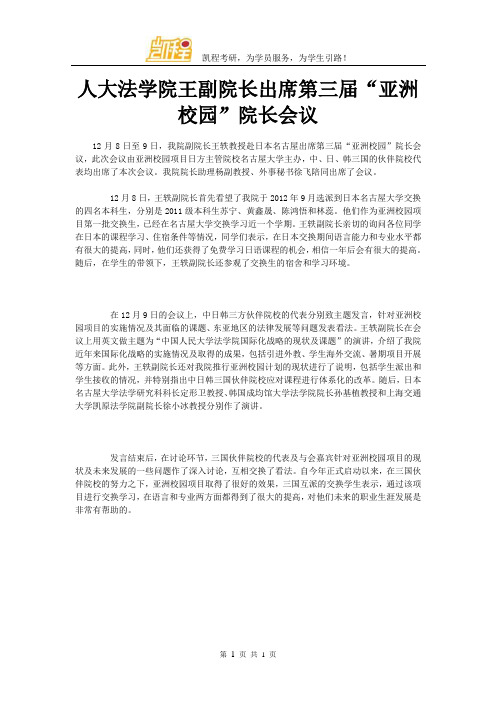
凯程考研,为学员服务,为学生引路!第 1 页 共 1 页 人大法学院王副院长出席第三届“亚洲校园”院长会议12月8日至9日,我院副院长王轶教授赴日本名古屋出席第三届“亚洲校园”院长会议,此次会议由亚洲校园项目日方主管院校名古屋大学主办,中、日、韩三国的伙伴院校代表均出席了本次会议。
我院院长助理杨副教授、外事秘书徐飞陪同出席了会议。
12月8日,王轶副院长首先看望了我院于2012年9月选派到日本名古屋大学交换的四名本科生,分别是2011级本科生苏宁、黄鑫晟、陈鸿悟和林蕊。
他们作为亚洲校园项目第一批交换生,已经在名古屋大学交换学习近一个学期。
王轶副院长亲切的询问各位同学在日本的课程学习、住宿条件等情况,同学们表示,在日本交换期间语言能力和专业水平都有很大的提高,同时,他们还获得了免费学习日语课程的机会,相信一年后会有很大的提高。
随后,在学生的带领下,王轶副院长还参观了交换生的宿舍和学习环境。
在12月9日的会议上,中日韩三方伙伴院校的代表分别致主题发言,针对亚洲校园项目的实施情况及其面临的课题、东亚地区的法律发展等问题发表看法。
王轶副院长在会议上用英文做主题为“中国人民大学法学院国际化战略的现状及课题”的演讲,介绍了我院近年来国际化战略的实施情况及取得的成果,包括引进外教、学生海外交流、暑期项目开展等方面。
此外,王轶副院长还对我院推行亚洲校园计划的现状进行了说明,包括学生派出和学生接收的情况,并特别指出中日韩三国伙伴院校应对课程进行体系化的改革。
随后,日本名古屋大学法学研究科科长定形卫教授、韩国成均馆大学法学院院长孙基植教授和上海交通大学凯原法学院副院长徐小冰教授分别作了演讲。
发言结束后,在讨论环节,三国伙伴院校的代表及与会嘉宾针对亚洲校园项目的现状及未来发展的一些问题作了深入讨论,互相交换了看法。
自今年正式启动以来,在三国伙伴院校的努力之下,亚洲校园项目取得了很好的效果,三国互派的交换学生表示,通过该项目进行交换学习,在语言和专业两方面都得到了很大的提高,对他们未来的职业生涯发展是非常有帮助的。
人大法学院陈教授率团考察英国羁押场所投诉处理机制
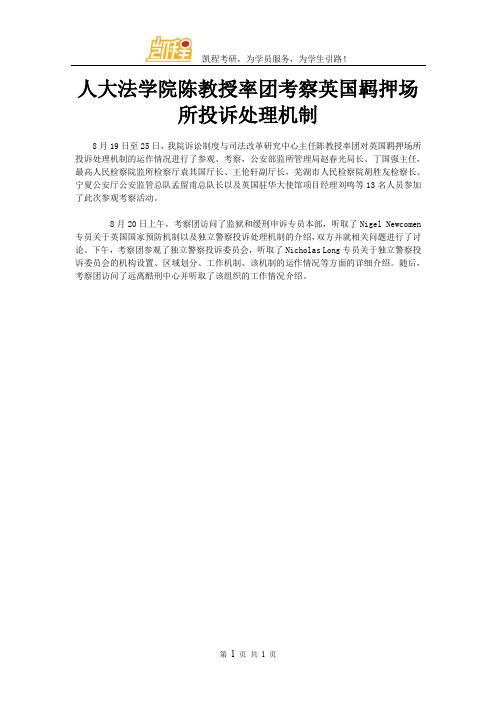
凯程考研,为学员服务,为学生引路!
第 1 页 共 1 页 人大法学院陈教授率团考察英国羁押场
所投诉处理机制
8月19日至25日,我院诉讼制度与司法改革研究中心主任陈教授率团对英国羁押场所投诉处理机制的运作情况进行了参观、考察,公安部监所管理局赵春光局长、丁国强主任,最高人民检察院监所检察厅袁其国厅长、王伦轩副厅长,芜湖市人民检察院胡胜友检察长、宁夏公安厅公安监管总队孟留甫总队长以及英国驻华大使馆项目经理刘鸣等13名人员参加了此次参观考察活动。
8月20日上午,考察团访问了监狱和缓刑申诉专员本部,听取了Nigel Newcomen 专员关于英国国家预防机制以及独立警察投诉处理机制的介绍,双方并就相关问题进行了讨论。
下午,考察团参观了独立警察投诉委员会,听取了Nicholas Long 专员关于独立警察投诉委员会的机构设置、区域划分、工作机制、该机制的运作情况等方面的详细介绍。
随后,考察团访问了远离酷刑中心并听取了该组织的工作情况介绍。
人大法学院台湾学子参加北京重点法学院校台湾学生赴沈阳参访交流活动

凯程考研,为学员服务,为学生引路!
第 1 页 共 1 页 人大法学院台湾学子参加北京重点法学
院校台湾学生赴沈阳参访交流活动 11月3日至6日,我院09级经济法学博士生林子程、10级民商法法学硕士研究生陈怡秀、10级宪法行政法法学硕士研究生曾奎谕、11级民商法法学硕士研究生吴家慧、09级本科生徐德容、11级本科生徐华阳6名来自台湾省的同学参加了由国务院台湾事务办公室主办的“北京重点法学院校台湾学生赴沈阳参访交流活动”,赴辽宁省沈阳市参观学习。
院团委学生兼职副书记曹昊辰,院团委学生工作助理贺佐琪带队参加了活动。
本次活动的主题是“共同追寻历史足迹,携手振兴中华民族”,旨在加强在大陆就学的台湾法政专业学生对中华历史文化的认知,增强台湾同学的民族认同感。
11月3日晚,我院同学一行抵达沈阳,出席了辽宁省台办在举办的欢迎晚宴。
11月4日上午,同学们先后参观了辽宁省博物馆和九一八纪念馆。
在参观辽宁省博物馆的过程中,同学们对辽宁省悠久的历史有了全面的了解,感受到了数千年辽宁人民创造出的灿烂辽河文化。
在九一八纪念馆,同学们学习了九一八事变后东北14年的抗战苦难史,对东北人民在抗战过程表现出的英勇精神表示了敬意,对中日乃至世界的友好和平表达了期待。
人大法学院与联合国开发计划署(中国)举行签约仪式
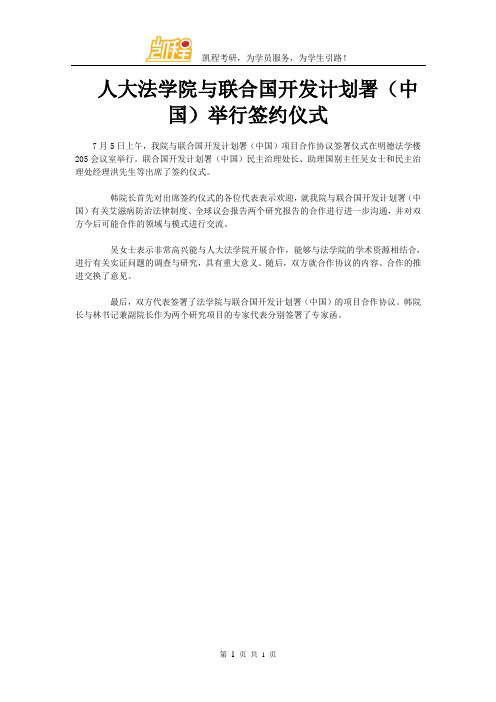
凯程考研,为学员服务,为学生引路!
第 1 页 共 1 页 人大法学院与联合国开发计划署(中
国)举行签约仪式
7月5日上午,我院与联合国开发计划署(中国)项目合作协议签署仪式在明德法学楼205会议室举行。
联合国开发计划署(中国)民主治理处长、助理国别主任吴女士和民主治理处经理洪先生等出席了签约仪式。
韩院长首先对出席签约仪式的各位代表表示欢迎,就我院与联合国开发计划署(中国)有关艾滋病防治法律制度、全球议会报告两个研究报告的合作进行进一步沟通,并对双方今后可能合作的领域与模式进行交流。
吴女士表示非常高兴能与人大法学院开展合作,能够与法学院的学术资源相结合,进行有关实证问题的调查与研究,具有重大意义。
随后,双方就合作协议的内容、合作的推进交换了意见。
最后,双方代表签署了法学院与联合国开发计划署(中国)的项目合作协议。
韩院长与林书记兼副院长作为两个研究项目的专家代表分别签署了专家函。
人大法学院与萨塞克斯大学法学院举办刑事法圆桌讨论会
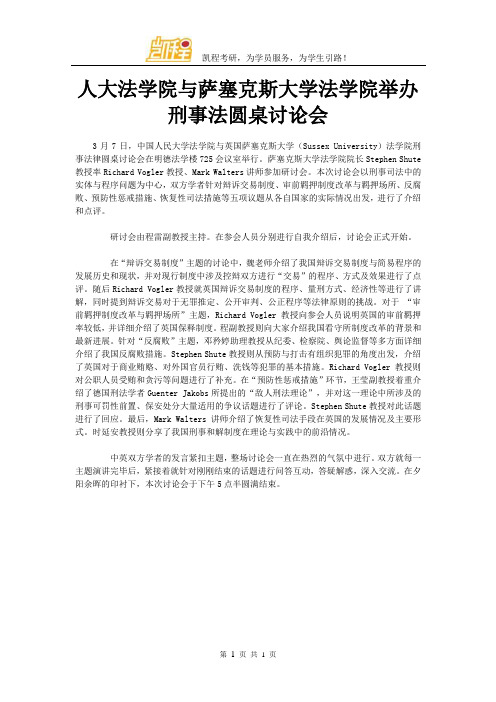
凯程考研,为学员服务,为学生引路!第 1 页 共 1 页 人大法学院与萨塞克斯大学法学院举办刑事法圆桌讨论会3月7日,中国人民大学法学院与英国萨塞克斯大学(Sussex University )法学院刑事法律圆桌讨论会在明德法学楼725会议室举行。
萨塞克斯大学法学院院长Stephen Shute 教授率Richard Vogler 教授、Mark Walters 讲师参加研讨会。
本次讨论会以刑事司法中的实体与程序问题为中心,双方学者针对辩诉交易制度、审前羁押制度改革与羁押场所、反腐败、预防性惩戒措施、恢复性司法措施等五项议题从各自国家的实际情况出发,进行了介绍和点评。
研讨会由程雷副教授主持。
在参会人员分别进行自我介绍后,讨论会正式开始。
在“辩诉交易制度”主题的讨论中,魏老师介绍了我国辩诉交易制度与简易程序的发展历史和现状,并对现行制度中涉及控辩双方进行“交易”的程序、方式及效果进行了点评。
随后Richard Vogler 教授就英国辩诉交易制度的程序、量刑方式、经济性等进行了讲解,同时提到辩诉交易对于无罪推定、公开审判、公正程序等法律原则的挑战。
对于 “审前羁押制度改革与羁押场所”主题,Richard Vogler 教授向参会人员说明英国的审前羁押率较低,并详细介绍了英国保释制度。
程副教授则向大家介绍我国看守所制度改革的背景和最新进展。
针对“反腐败”主题,邓矜婷助理教授从纪委、检察院、舆论监督等多方面详细介绍了我国反腐败措施。
Stephen Shute 教授则从预防与打击有组织犯罪的角度出发,介绍了英国对于商业贿赂、对外国官员行贿、洗钱等犯罪的基本措施。
Richard Vogler 教授则对公职人员受贿和贪污等问题进行了补充。
在“预防性惩戒措施”环节,王莹副教授着重介绍了德国刑法学者Guenter Jakobs 所提出的“敌人刑法理论”,并对这一理论中所涉及的刑事可罚性前置、保安处分大量适用的争议话题进行了评论。
人大法学院队员晋级纳尔逊
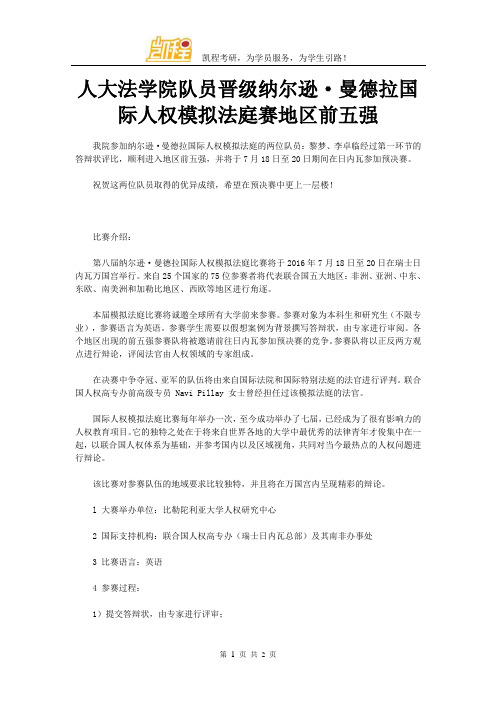
人大法学院队员晋级纳尔逊·曼德拉国际人权模拟法庭赛地区前五强我院参加纳尔逊·曼德拉国际人权模拟法庭的两位队员:黎梦、李卓临经过第一环节的答辩状评比,顺利进入地区前五强,并将于7月18日至20日期间在日内瓦参加预决赛。
祝贺这两位队员取得的优异成绩,希望在预决赛中更上一层楼!比赛介绍:第八届纳尔逊·曼德拉国际人权模拟法庭比赛将于2016年7月18日至20日在瑞士日内瓦万国宫举行。
来自25个国家的75位参赛者将代表联合国五大地区:非洲、亚洲、中东、东欧、南美洲和加勒比地区、西欧等地区进行角逐。
本届模拟法庭比赛将诚邀全球所有大学前来参赛。
参赛对象为本科生和研究生(不限专业),参赛语言为英语。
参赛学生需要以假想案例为背景撰写答辩状,由专家进行审阅。
各个地区出现的前五强参赛队将被邀请前往日内瓦参加预决赛的竞争。
参赛队将以正反两方观点进行辩论,评阅法官由人权领域的专家组成。
在决赛中争夺冠、亚军的队伍将由来自国际法院和国际特别法庭的法官进行评判。
联合国人权高专办前高级专员 Navi Pillay 女士曾经担任过该模拟法庭的法官。
国际人权模拟法庭比赛每年举办一次,至今成功举办了七届,已经成为了很有影响力的人权教育项目。
它的独特之处在于将来自世界各地的大学中最优秀的法律青年才俊集中在一起,以联合国人权体系为基础,并参考国内以及区域视角,共同对当今最热点的人权问题进行辩论。
该比赛对参赛队伍的地域要求比较独特,并且将在万国宫内呈现精彩的辩论。
l 大赛举办单位:比勒陀利亚大学人权研究中心2 国际支持机构:联合国人权高专办(瑞士日内瓦总部)及其南非办事处3 比赛语言:英语4 参赛过程:1)提交答辩状,由专家进行评审;2)地区前五强赴日内瓦参加预决赛的竞争,参赛队将以正反两方观点进行辩论,评阅法官由人权领域的专家组成;3)冠、亚军争夺赛将于2016年7月在联合国人权理事会会议厅进行,评阅法官来自国际法院和国际特别法庭。
人大法学院代表队跻身牛津大学普莱斯国际模拟法庭十六强

人大法学院代表队跻身牛津大学普莱斯国际模拟法庭十六强4月9日,第六届普莱斯传媒法国际模拟法庭总决赛在牛津大学正式拉开序幕。
我院代表队由姚欢庆副教授担任指导,由孟也甜、秦蓁、刘致远、孙毅、林雅莉等五位同学组成。
我院代表队在本次模拟法庭的四场比赛中,文书写作部分均全面胜出对手,拿满得分点,书面写作总成绩在所有参赛队伍中名列第四;参赛队最终凭借扎实的法律基础和突出的语言能力,以第14名的好成绩在16强中占据了一席之地。
本届模拟法庭吸引了来自中国、美国、英国、新加坡、印度等在内的二十个国家近九十支参赛队伍,其中不乏英国剑桥大学、牛津大学等世界名校代表队。
通过此前书面答辩阶段的激烈竞争,共40支队伍进入其后在牛津大学进行的口头辩论阶段。
我院代表队顺利取得赴牛津参加口头辩论阶段比赛的入场券,并于4月8日抵达,迎接比赛到来。
第一场预选赛,我院对阵阿联酋大学代表队,我方作为申诉方首先发言。
法官在发言过程中针对事实争点和法律依据等进行了多方面的提问,我院选手均灵活应对,Rachael Craufurd Smith评委在赛后对我院选手的答问能力和对法律及事实的掌握能力给予了肯定评价。
在答辩方发言结束之后的反驳阶段,我院选手抓住了对方对于案件事实争点的明显逃避进行大力回击,赢得了评委的赛后赞许。
最终我院代表队以9:0的大比分赢得这场比赛。
第二场预选赛,我院以答辩方的立场迎战来自印度分赛区季军的Jindal Global Law School代表队。
面对来自英语母语国家的强大对手,我院选手怀着良好的心态上场,在进行答辩发言时灵活改变了论述顺序,针对对方论点一一进行临场回应,奉献了一场精彩的比赛。
评委Michael Wiener在赛事评语中说,我院选手的发言方式是答辩方律师很少能够做到的,但却正是应该做到的。
最终,我院代表队拿到memo写作的得分点,但由于口头辩论上的微弱劣势惜败对手。
第三场预选赛,我院对阵新加坡国立大学法学院代表队,作为申诉方首先发言。
人大法学院“律政菁英工作坊”第一期国际法律业务工作坊成功开班
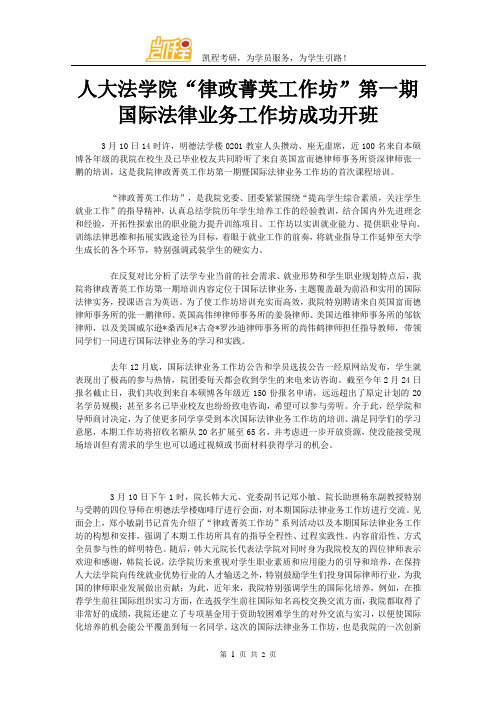
人大法学院“律政菁英工作坊”第一期国际法律业务工作坊成功开班3月10日14时许,明德法学楼0201教室人头攒动、座无虚席,近100名来自本硕博各年级的我院在校生及已毕业校友共同聆听了来自英国富而德律师事务所资深律师张一鹏的培训,这是我院律政菁英工作坊第一期暨国际法律业务工作坊的首次课程培训。
“律政菁英工作坊”,是我院党委、团委紧紧围绕“提高学生综合素质,关注学生就业工作”的指导精神,认真总结学院历年学生培养工作的经验教训,结合国内外先进理念和经验,开拓性探索出的职业能力提升训练项目。
工作坊以实训就业能力、提供职业导向、训练法律思维和拓展实践途径为目标,着眼于就业工作的前奏,将就业指导工作延伸至大学生成长的各个环节,特别强调武装学生的硬实力。
在反复对比分析了法学专业当前的社会需求、就业形势和学生职业规划特点后,我院将律政菁英工作坊第一期培训内容定位于国际法律业务,主题覆盖最为前沿和实用的国际法律实务,授课语言为英语。
为了使工作坊培训充实而高效,我院特别聘请来自英国富而德律师事务所的张一鹏律师、英国高伟绅律师事务所的姜袅律师、美国达维律师事务所的邹钦律师,以及美国威尔逊*桑西尼*古奇*罗沙迪律师事务所的尚伟鹤律师担任指导教师,带领同学们一同进行国际法律业务的学习和实践。
去年12月底,国际法律业务工作坊公告和学员选拔公告一经原网站发布,学生就表现出了极高的参与热情,院团委每天都会收到学生的来电来访咨询。
截至今年2月24日报名截止日,我们共收到来自本硕博各年级近150份报名申请,远远超出了原定计划的20名学员规模;甚至多名已毕业校友也纷纷致电咨询,希望可以参与旁听。
介于此,经学院和导师商讨决定,为了使更多同学享受到本次国际法律业务工作坊的培训、满足同学们的学习意愿,本期工作坊将招收名额从20名扩展至65名,并考虑进一步开放资源,使没能接受现场培训但有需求的学生也可以通过视频或书面材料获得学习的机会。
3月10日下午1时,院长韩大元、党委副书记郑小敏、院长助理杨东副教授特别与受聘的四位导师在明德法学楼咖啡厅进行会面,对本期国际法律业务工作坊进行交流。
人大法学院四名学子荣获美迈斯(北京)法学奖学金

凯程考研,为学员服务,为学生引路!第 1 页 共 1 页 人大法学院四名学子荣获美迈斯(北京)法学奖学金2011年10月27日晚,美国美迈斯律师事务所举行了2011年度奖北京地区法学奖学金颁奖典礼,我院2009级法学硕士研究生莫菲、2008级本科生谢飘、孔欣同学荣获2011年度美迈斯北京地区法学奖学金优秀奖,硕士研究生袁艺荣获提名奖。
颁奖典礼在北京柏悦酒店宴会厅举行。
来自中国人民大学、北京大学、清华大学、中国政法大学、对外经贸大学的获奖学生齐聚一堂。
我院证据法教研室邓矜婷讲师作为嘉宾出席颁奖典礼。
律师事务所几位合伙人首先为2011年获奖同学一一颁奖。
随后,美迈斯律师事务所主管亚洲业务的赵宏绚律师向获奖同学表达了祝贺并发表了以“Change ”为主题的演讲;美迈斯律师事务所合伙人罗大伟(DAVID J. ROBERTS )先生也作了幽默风趣的演讲,2011年特等奖获得者发表了获奖感言。
颁奖仪式后举行了晚宴,与会嘉宾与获奖同学进行了交流并合影留念。
3月底,我院本年度美迈斯奖学金评选工作正式启动,院团委通过网站发布了申报公告,共收到申报材料23份,经过对申报材料认真细致的前期审查,共有23名符合条件的申报人进入面试程序。
我院团委邀请了丁相顺副教授、姚欢庆教授、杜焕芳教授组成专门的评审委员会,依照奖学金章程的规定,并结合美迈斯律师事务所考察候选人的特点和侧重点,对申报者的简历材料、外语能力、综合素质及面试表现进行了综合测评,同时通过与个别因特殊情况未能到到场的同学进行电话面试,最终确定了推荐人选。
美迈斯法学奖学金(北京)是由美国美迈斯律师事务所北京代表处于2004年在北京创设的,旨在鼓励和资助中国法律专业学生致力于法学学习和研究,此项工作至今已持续七年。
该项奖学金面向北京大学、中国人民大学、清华大学、中国政法大学、对外经贸大学的五所法学院的本科三年级学生、研究生二年级学生开设,每年共评出2个特等奖、10个优秀奖及8个提名奖。
韩世远发表情况一览表-TsinghuaUniversity

韩世远发表情况一览表(整理时间:2016年12月30日)著作类1.《合同法总论》(独著),法律出版社2004年4月第1版;法律出版社2008年3月第2版;法律出版社2011年8月第3版。
2.《合同法学》(独著,普通高等教育“十一五”国家级规划教材),高等教育出版社2010年11月版。
3.《违约损害赔偿研究》(独著),大32开/516页,法律出版社1999年1月版。
4.《履行障碍法的体系》(独著),法律出版社2006年2月版。
5.《履行障碍法研究》,与下森定教授共同主编,法律出版社2006年3月版。
6.《新合同法原理与案例评释》(上、下)(副主编;主编:崔建远),大32开/1534页,吉林大学出版社1999年5月版。
7.《合同法总则》(下)(与张广兴合作),大32开/252页,法律出版社1999年10月版。
8.《合同法》(修订本,司法部“九五”规划教材)(副主编;主编:崔建远),大32开/526页,法律出版社2000年4月版。
9.《合同法》(第三版)(副主编;主编:崔建远),1/16开本/476页,法律出版社2003年3月版;第四版,2007年。
10.梁慧星主持:《中国民法典草案建议稿》(起草第30章合同的解除与终止;第32章违约责任。
并与崔建远教授一起负责第4编“合同”的统稿),法律出版社2003年5月版。
11.《合同法学》(陈小君主编,普通高等教育“十五”国家级规划教材),高等教育出版社2003年10月版;2009年11月第二版(普通高等教育“十一五”国家级规划教材),撰写其中第二章“合同概述”。
12.《民法9人行》第2卷(执行主编,崔建远主编),金桥文化出版(香港)有限公司2004年版。
13.崔建远、韩世远著:《债权保障法律制度研究》,清华大学出版社2004年9月版。
14.崔建远、韩世远、于敏:《债法》,清华大学出版社2010年12月版。
15.崔建远、韩世远、申卫星、王洪亮、程啸、耿林:《民法总论》,清华大学出版社2010年12月版。
英国萨塞克斯大学招生与国际事务办公室主任Marcus Williams教授访问人大法学院

凯程考研,为学员服务,为学生引路!
第 1 页 共 1 页 英国萨塞克斯大学招生与国际事务办公室主任Marcus Williams 教授访问人大
法学院
11月14日下午,我院副院长王教授在明法205会议室会见了英国萨塞克斯大学招生与国际事务办公室主任Marcus Williams 教授,我院证据法教研室何教授陪同参加了会见。
Marcus Williams 教授首先向王副院长和何教授说明了此次访问法学院的目的,并传达了英国萨塞克斯大学法学院希望与人民大学法学院合作的意向和合作领域。
他指出,萨塞克斯大学法学院Daniel 教授去年在人大法学院做访问学者期间,就曾与何家弘教授探讨了两院在反腐败和政府治理领域的合作,此次来访就是希望继续上次的合作洽谈,落实合作的具体细节。
王轶副院长对Marcus Williams 教授的到来表示欢迎,并向Marcus Williams 教授介绍了我院与其他国外院校的合作情况。
会谈中,双方就学生交换、教师交流、合作举办学术研讨会等具体合作展开了洽谈。
- 1、下载文档前请自行甄别文档内容的完整性,平台不提供额外的编辑、内容补充、找答案等附加服务。
- 2、"仅部分预览"的文档,不可在线预览部分如存在完整性等问题,可反馈申请退款(可完整预览的文档不适用该条件!)。
- 3、如文档侵犯您的权益,请联系客服反馈,我们会尽快为您处理(人工客服工作时间:9:00-18:30)。
凯程考研,为学员服务,为学生引路!
第 1 页 共 1 页 牛津大学法学院Mindy Chen-Wishart 研
究员访问人大法学院
9月19日下午,王副校长、韩院长在明法205会议室会见了牛津大学法学院Mindy Chen-Wishart 研究员,我院民商法教研室叶教授、院长助理杨副教授、刑法教研室时延安副教授、比较法教研室Steven Leonard 助理教授、朱虎讲师陪同参加了会见。
Mindy Chen-Wishart 研究员此次是作为牛津大学法学院院长代表访问我院,与我院洽谈合作事宜。
王副校长首先对Mindy Chen-Wishart 研究员的到来表示欢迎,他提到人民大学和牛津大学一直保持了良好的关系,包括双方校领导的互访等。
韩院长首先通过一段法学院的英文宣传片的形式简单地介绍了人大法学院,他提到,今年暑假牛津大学Nick Barber 教授来在我院举办的英国宪法暑期班的授课,深受学生欢迎。
人大法学院希望将来能通过邀请更多的牛津大学法学院的知名教授来我院授课的形式,让因经济或者其他原因而无法在牛津大学法学院学习的同学,能同样地与世界著名学府的教授进行交流、感受牛津大学的教学氛围。
同时,韩大元院长指出。
作为一个院长,他最关心的是自己能否为法学院学生创造更多的出国学习机会,让他们有机会学习不同的法律制度和感受不同的法律文化。
他希望人大法学院与牛津大学法学院能建立学生交流机制,从而促进两院的学生国际化培养。
林教授、杨副教授分别向Mindy Chen-Wishart 研究员介绍了中国商法的现状与发展、我院与亚洲、中国港澳台地区法学院的合作交流情况。
会见结束后,时副教授陪同Mindy Chen-Wishart 研究员参观了我院图书馆。
